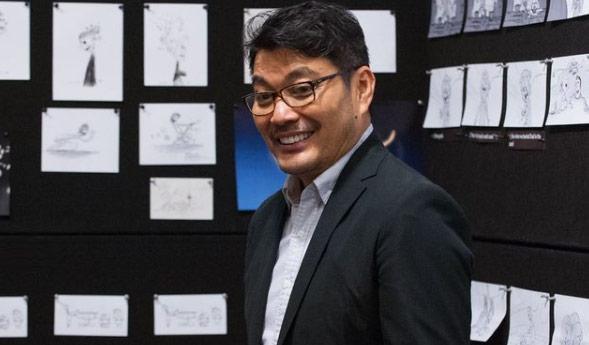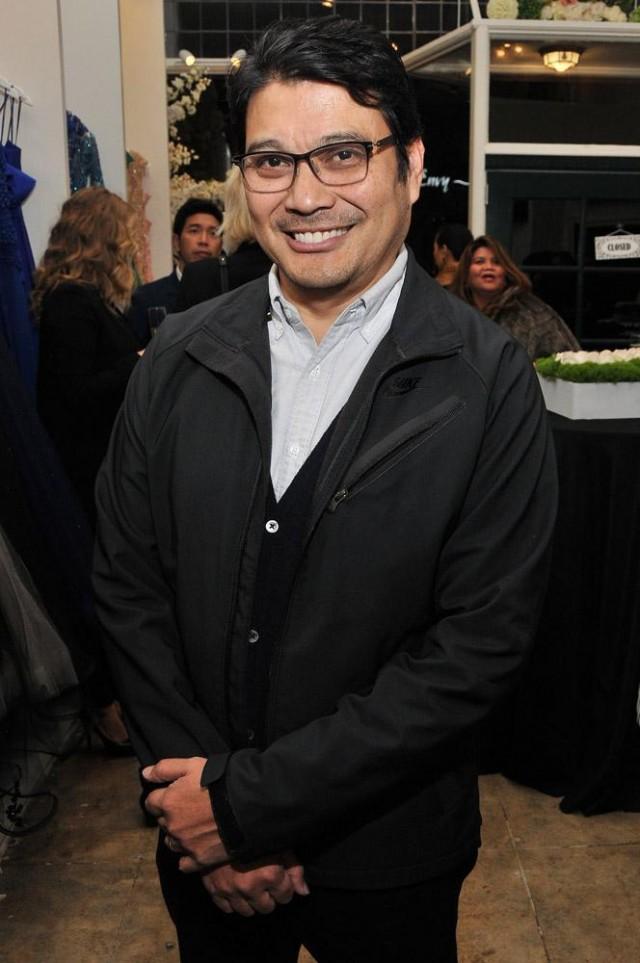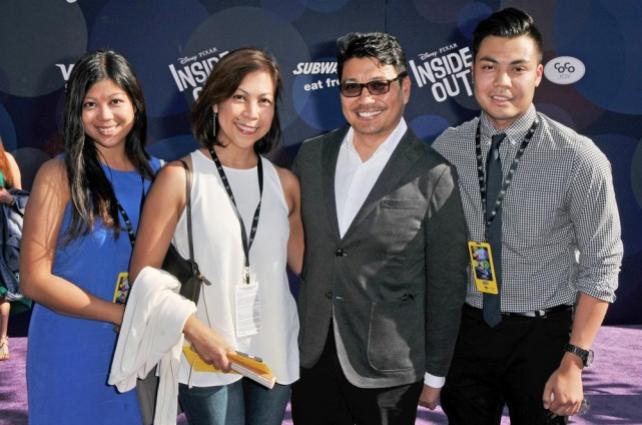Fil-Am filmmaker Ronnie Del Carmen jumps from Pixar to Netflix to do Philippine-inspired content

Los Angeles — Ronnie Del Carmen has gone a long way from his humble beginnings in Cavite City, Philippines.
Right after high school, he first became a painter on the set of Francis Ford Coppola’s 1979 film “Apocalypse Now” (which was filming in the Philippines). He then became an art director for print and television advertising campaigns, and then a storyboard artist and Story Supervisor at various U.S. studios.
In 2000, he joined Pixar, where he gained recognition as a great storyteller, contributing his talents and visions in award-winning films like “Finding Nemo” and “Up” (story supervisor) and “Inside Out” as a co-director and writer of the original story, among others.
The University of Santo Tomas graduate and outstanding alum awardee is breaking loose once again to join Netflix, where he will develop an original animated feature as part of an exclusive over-all deal. The more exciting part is that Ronnie is writing and developing a feature — that he plans to direct, mind — inspired by Philippine culture and mythology.

Based in San Francisco, Ronnie talked to us more about his move and below are excerpts of our conversation:
What made you move from Pixar to Netflix? How you did you get the gig? Why Netflix?
Everybody has Netflix in their home, and you can see so much in Netflix, right? Not only a lot of content, but it's a lot of content that comes from every corner of the globe; stories, movies, series that come from languages that you won't normally encounter. You wouldn't seek them out, if they weren't just a click away.
As a storyteller, that to me feels like such an amazing opportunity. To be able to tell a story from whatever corner of the globe you're from. And in this arena that actually speaks to the rest of the world. Instantaneously!
I’m someone who has worked in a studio system for several decades, working within the brand confines of the studio. I'm very happy to have done it, but at the same time, I have done it for a long time.
So when I look at Netflix, I see the diversity and inclusion and the kind of stories that are being told there. But also it seems like there’s a creative freedom to be able to tell that story in however way you want. That was enticing to me and it was the next step that I had wanted to explore.
So when I approached Netflix with my stories, they were not only very receptive but I found out, it is part of their mission to make content just like the ones that I was bringing to them. So they said, "We would love to invite you to come and tell your stories here." I’m so lucky that happened.
You’ll be doing a lot of animated series and films. What kind of Filipino stories are you planning to tell the world?
Mostly, I'm trying to tell the stories that I feel very close to. The ones that I’ve not explored ever.
Growing older now as a Filipino who had lived in the Philippines, migrated to the US and then loved coming home, I realize that I don't know much about my own country's history, because the textbooks that I grew up reading, they seemed limited to me. I feel like they didn't offer me enough.
As I got older, I started looking into what is the history of the country? What is the history of the country even before our colonizers arrived? What were the stories around there? About the culture, the fabrics, the crafts, the music, all of those things are so fascinating. I feel that my journey specifically now is to tell the stories about the lore and the things that we grew up with.
I grew up in Cavite City in the '60s as a kid. I’d watch TV incessantly. But just like any Filipino kid if you weren't watching TV, you'd be outside playing, you'd play outside even if it's raining. If it's summer, you'd be chasing water buffalos and climbing trees.
And then during typhoon season you would have to huddle together with one candle in the middle and in the dark, somebody would be telling ghost stories and creature stories. And it would be the elders who would be telling you stories that they've heard when they were kids. Nobody else hears those stories other than Filipino kids. So I'm thinking that would be fascinating to have the rest of the world hear these stories too.
Who in your family is the great storyteller?
That would be my mother. My mom can spin a tale in any gathering that she enters into. She becomes the center focus of any living room. Somehow the stories will be about her or the stories that made her laugh or cry. Also at some point she will be singing. My mom is a singer. She used to sing for a big band when I was young. And so, yes, she has a way of telling very good stories, she's very compelling.

Do you tell stories about the Philippines also to your kids? What kind of stories do you tell them?
Not as much as I wish I had. I did tell them stories as they were growing up because my kids were eight and six years old when they moved here to the US. They didn't have as much exposure to them as opposed to being back home, hearing them from people or relatives. So I had to make up for that, but I don't think I did as thorough a job as I could have. But I did tell them a few here and there.
Who will be in your team in Netflix? Will you be including a lot of Filipino talents, animators, cast and crew?
I hope to. This is a very diverse industry and there's a lot of amazing Filipino talent in animation. So I hope that we can find them and have them belong to team, because these kinds of voices are the ones I need to make sure that we have an authentic story that represents our culture well.
You just turned 61 recently.
Yeah, I know, right? It's hard to believe.
Did you ever imagine this happening right now in your life, in this journey?
I would have loved to have it happened sooner, but you're not in charge of fate. I don't know. The expression is, play the ball where it lies. Here it is right now and that's what we're doing. So I tend not to question that anymore and I hope to complete the film and release it. But animated features take a very long time to make. So I'm hoping to do a very good job. Doing a good job doesn't come easy, and it certainly doesn't come fast.
Was it bittersweet leaving Pixar? Did you have a farewell party?
Well, we couldn't because of COVID. It's bittersweet because I belonged to the company for 20 years. I learned a lot from there from a lot of people. A lot of people I worked with are friends and extended family. Our group there, the “Pixnoys,” is a Filipino community. So I felt very at home.
But in order to pursue adventure, sometimes you have to leave home, right? This is what all Filipinos do. We leave the country to find fortune and opportunity, but we come home back to the islands and recharge and then leave again. So we're adventurous. I have a lot of that adventurous spirit, so I knew it was time for me to go and seek it.
How do you see yourself five years from now?
Five years from, I hope to have made this movie already, that's my thing. I hope to also have gone back and forth to the Philippines and maybe gotten a deeper tan at a white sand beach. My needs are very simple.
When was the last time you were in the Philippines?
The last time I was in the Philippines was 2019 December celebrating my birthday as I turned 60.
Are you planning to go back soon?
I hope so. My son lives there and we're always concerned about how he's doing and love to see him. My daughter is in LA, so we're kind of in three different places. We'd love to be always together. Last time we were all together was in December of 2019 and January of 2020. That was also when Taal blew up. We were driving to the airport, it was like, "Oh my gosh, I don't think I can go home! They shut down the airport!”
All of this happened during the lockdown. What did you learn about yourself during the lockdown?
I learned that I liked staying home. I thrive in a community of filmmakers but now you're forced to stay away from them. I learned to just listen to your own counsel. It's really quite amazing. You have this very pure way of looking at your work and hearing your own voice, which is really fortunate for me because I am telling a story largely from my own experiences. In a world where you're always collaborating, you have to let as many voices come in to help you make these things. You have the share the creative journey more. That can change the nature of the story you truly want to make. This kind of isolation allows me to listen to my voice a lot more and almost just singly just me so that I can represent the kind of film and the characters that I want to talk about and show to the world. — LA, GMA News




